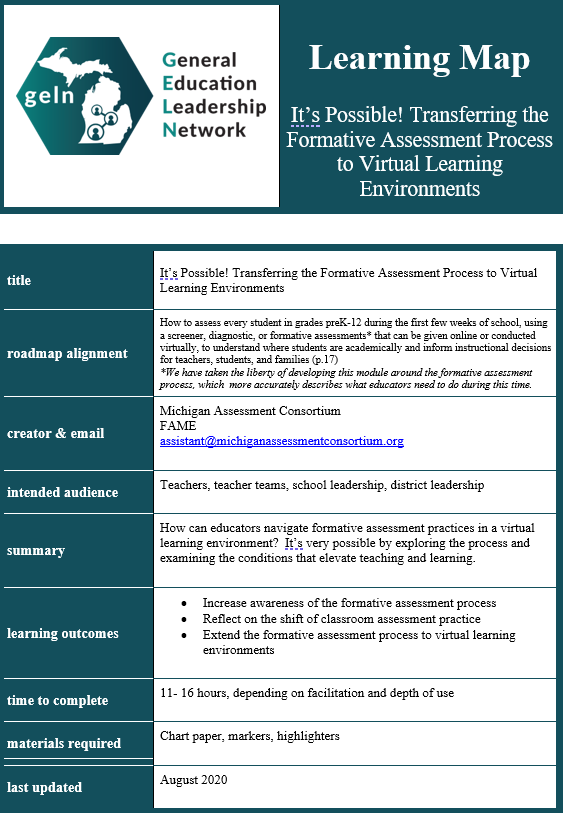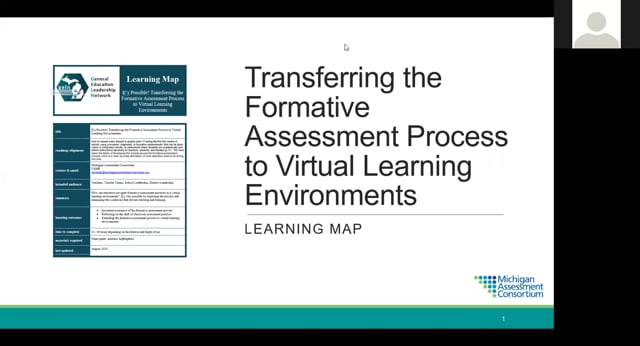Is it possible to transfer the formative assessment process to a virtual environment?
Educators can transfer the use of formative assessment practices to virtual learning environments. Understanding formative assessment as a process and exploring the conditions necessary to use the process to elevate teaching and learning remain a constant and imperative whether the teaching and learning occurs face-to-face, online, or in a hybrid format.
Using the formative assessment process (FAP) in virtual learning environments requires thoughtful and informed pairing of technology tools to collect evidence of student understanding and explain how that evidence can be used to adjust learning and teaching tactics.

In the context of COVID-19, school districts are working from comprehensive plans aligned to Michigan’s 2020-2021 Back to School Roadmap and new state laws—all of which depend on professional learning. The resources offered below support a free Asynchronous Professional Learning Map titled, It’s Possible! Transferring Formative Assessment Practice to Virtual Learning Environments.
The Learning Map was prepared by the Michigan Assessment Consortium and offered in partnership with MAISA’s General Education Leadership Network (GELN) Continuity of Learning Task Force. It is one of a library of Learning Maps available on GELN’s interactive website to support local professional learning plans and provide high-quality resources to all teachers across Michigan in 2020-21. It includes hyperlinks to all suggested resources, coordinated to support the learning of groups or individuals from engagement through extending the learning.
Another MAC-produced Learning Map, Prioritizing and Assessing Standards to Enhance Student Learning, is also available as a curated collection.

This short introduction to the Learning Map, It’s Possible! Transferring the Formative Assessment Process to Online Learning Environments, establishes a shared understanding for the formative assessment process and suggests how educators can engage in learning to use the formative assessment process in online environments.
We’ve featured below select resources from the Learning Map, It’s Possible! Transferring the Formative Assessment Process to Virtual Learning Environments.
Featured resources include: recorded webinars, readings explaining components and elements of the formative assessment process (FAP), Tech Tools aligned to components of FAP, and a FA Self-Reflection Guide. For more general resources about FAP, explore our curated collection page for Formative Assessment.
Formative Assessment Self-Reflection Coding Booklet
The purpose of this coding booklet is to permit teachers to examine their instruction, reflect on areas for improvement and observe changes over time. The booklet contains rubrics and are coordinated to FAME components and elements.
Formative Feedback Navigating the complexity of engaging student thinking
Providing and managing formative feedback in anonline learning environment is considered in the webinar featured on this event page.
Quick Guide to FAME Components & Elements
This graphic depicts how the formative assessment process has been conceptualized and is taught through the FAME program in Michigan.
Teacher Tech Tools and Formative Assessment
This resource highlights 12 tech tools and how they can be used to implement aspects of FAP, such as: eliciting evidence of student thinking, providing formative feedback, panning instruction, and using questioning strategies. Tutorial videos are hyperlinked to the Tech Tools.
Using the Formative Assessment Process to Enhance Student Learning in an Online Environment
In this webinar, experienced K-12 online teachers adapt their formative practices to an online environment. They also feature technology tools that are well designed to illuminate learning targets and collect evidence of student understanding in real time.
Video Clip: Margaret Heritage: What conditions does a school district need to create to emphasize and shift assessment practice to more assessment for learning and less assessment of learning?
In this short video Margaret Heritage identifies factors and conditions necessary for districts to integrate and sustain the use of assessment to support learning (AFL) in their assessment system.
Webinar 3 – FAMEous Wednesday Webinar Series #3
This recorded webinar features two teachers explaining how they provide and use feedback that moves student learning forward. They highlight technology tools, equity issues for their students and their quest to provide rigorous curriculum.
Webinar 4 – FAMEous Wednesday Webinar Series #4
The 4th webinar in the FAMEous series focuses on building relationship to create an equitable learning culture remotely. High expectations, student assets, real-world and relevant tasks are highlighted.
